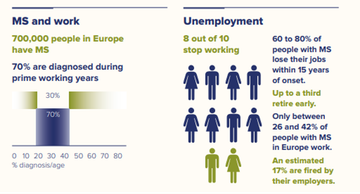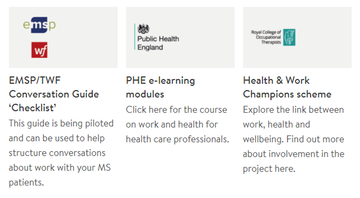MS and work - an important health outcome
KnowledgeTo make sure that ‘no patient is left behind’, the focus of the national initiative to 'Raise the Bar' for MS, addressing the social determinants of health in people with MS is a must.
With a growing body of evidence highlighting the importance of addressing social determinants of health and lifestyle factors as a core means of both managing and treating MS, the Living Well with MS workstream wants to support healthcare professionals with the tools and resources to feel confident in approaching these subjects with the MS community.
Remaining in work is one of these core areas.
'Ready for Work' employment guide

Infographics from the 'Ready for Work' publication, p4-5
Infographics from the 'Ready for Work' publication, p4-5

Infographics from the 'Ready for Work' publication, p4-5
Between 2016 and 2019, Shift.ms carried out a Comic Relief-funded project looking at MS and work. Their short video shares findings around the experiences of people with MS and healthcare professionals regarding remaining in, or returning to, work. It also features a range of interviews conducted with experts in this field, who share experience, expertise, and signpost towards a range of resources to support healthcare professionals in having conversations around work.
Key findings about MS and work, from people living with MS
75% say that MS affects their ability to remain in, and progress in, work.
63% felt 'very worried' about their ability to continue working.
(statistics from a Shift.ms survey of 245 UK-based MSers during the project covering 2016-2019)
15% of 8,000 respondents said that they were struggling on their current household income - and of those struggling, one third had either had to reduce their working hours or stop entirely.
22% of 8,000 respondents who had retired early or left work entirely as a result of their MS said they wanted to stay in work, but were unsupported by their employer to do so.
(statistics from an MS Society survey of 8,000 UK-based people with MS in 2020)
An additional MS Society survey of 2,000 people with MS conducted during lockdown (‘Life in Lockdown’) found that, of those that were in employment before lockdown, 29% had had their pay or hours of employment reduced.
In shift.MS's survey of healthcare professionals regarding their role in discussing returning to, or remaining in work with their patients, some respondents raised concerns about their skills, knowledge or confidence in supporting these discussions.

Still from video 'MS Reporters: Work as a health outcome’ (4.42 of 15 minutes) highlighting some healthcare professionals concerns in discussing work and health
There is a range of tools and resources available to help healthcare professionals grow their understanding of, and confidence in discussing this vital area of health and wellness.

The resources highlighted on shift.MS's 'MS and Work' page at https://shift.ms/ms-and-work
One of these is the free online course from Public Health England called 'Work and health'. The e-learning course addresses the crucial relationship between work and health and is intended to improve healthcare practitioners’ confidence to support patients with long term or chronic health conditions, via brief conversations in routine consultations.
Other resources include the Health and Work Champions scheme from the Royal College of Occupational Therapists, and the 'Ready for Work employment guide: 'A guide for Health Care Professionals to have Conversations on Work with People with Multiple Sclerosis: Why and how should HCPs talk to people with MS about work?'
When thinking about discussions around work, use the 5 R's
Raise the work question
- Recognise the risk factors of being out of work
- life expectancy
- quality of life
Respond to straightforward work questions
Refer on - use the specialists available
Re-visit this question regularly
Shared in the MS reporter's video 'Work as a health outcome', in a section of interview with Genevieve Smyth from the Royal College of Occupational Therapists (at minute 9.38)
Find out more or access the resources
The Shift.ms video 'Work as a health outcome'
The Shift.ms Work and MS page
Public Health England's e-learning course 'Work and health'.
The Health and Work Champions scheme from the Royal College of Occupational Therapists
The 'Ready for Work employment guide: 'A guide for Health Care Professionals to have Conversations on Work with People with Multiple Sclerosis: Why and how should HCPs talk to people with MS about work?'
'No person left behind: the current situation and a vision for the future' - a summary of the social determinants of health survey as part of Living well with MS, within Raising the Bar.
Public Health England's information on 'Health matters: health and work'
Related articles
Encouraging excellence, developing leaders, inspiring change
MS Academy was established in 2016 and in that time has accomplished a huge amount with exciting feedback demonstrating delegates feel inspired and energised along their personal and service development journeys. The various different levels of specialist MS training we offer are dedicated to case-based learning and practical application of cutting edge research.


